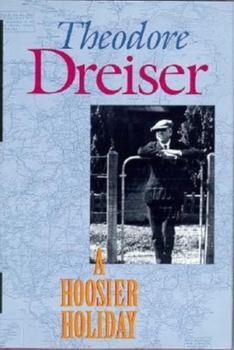A Hoosier Holiday
Select Format
Select Condition 
Book Overview
"Though far from the author's usual musings, this is actually a forerunner to the American road novel and very well could have been one of the inspirations for Jack Kerouac . . . this is a fine addition to public and academic libraries." --Library Journal
"Theodore Dreiser, road warrior . . . Dreiser's account of his homecoming will touch a familiar and responsive chord in anyone who has undertaken one. . . . In that, as in so much else...
Format:Paperback
Language:English
ISBN:0253211212
ISBN13:9780253211217
Release Date:August 1998
Publisher:Indiana University Press
Length:560 Pages
Weight:1.65 lbs.
Dimensions:1.1" x 6.1" x 9.1"
Customer Reviews
3 ratings
Dreiser's motor trip back home to Indiana
Published by Thriftbooks.com User , 18 years ago
In the summer of 1915, at a party in NYC for Edgar Lee Masters, illustrator Franklin Booth, a fellow Hoosier, asked Dreiser if he would care to accompany him on a motor trip to Indiana. Sensing the possibility of making a book out of the trip, Dreiser agreed. On August 11, Dreiser and Booth, along with a driver/mechanic named Speed, left NYC for the great midwest of their childhoods. This, the book that resulted from the trip, is many things: travelogue, personal memoir, soap box for Dreiser's unorthodox beliefs, among other things. As a travelogue, it's relatively easy to trace their journey almost town to town (no maps are in the book) because Dreiser names many of them; he is also impressed by a lot of them and seems to be consistently enthused about what might be around the next bend. The year being 1915, one might assume they would've taken the newly established Lincoln Highway, but they didn't, electing to go via a more circuitous route through Scranton, Elmira, and Buffalo. Dreiser is obviously thrilled by motor travel and waxes ecstatically about it throughout the trip. After reaching Indiana and visiting some old familiar places, Dreiser's comments are sometimes cynical and critical (especially of small-town attitudes and prejudices), but are also enthusiastic and proud (he has a Whitmanesque belief in the American people). But the reader must also endure sentences like these: "I often ask myself what it is all about, anyhow, and what are we here for, and why should anyone worry whether they are low or high, or moral or immoral. What difference does it really make?" Expressing sentiments like these is what kept Dreiser in trouble with the critics. All in all, it's a very interesting book. Dreiser's muscular prose pulls the reader along, and most of what he has to say is still relevant. The only thing sorely missing is an index, which would be very helpful. Like all long car trips there are slow, dreary stretches, but not nearly enough to wish you stayed home.
Dreiser and Me
Published by Thriftbooks.com User , 24 years ago
I read Sister Carrie when I was a teenager in China. The other day I listened to a Hoosier's holiday on Talking Books. He went back to his hometown after some thirty years. I went back to my hometown, Hangzhou, China and saw my old house now completely destroyed and replaced by a huge scaffolding. Somehow I felt my experience wasn't so different from Dreisers. I liked the book so much I'm going to order a copy to read certain parts again, although I have been in Indianapolis exactly once in my lifetime. Indianapolis and Hangzhou are world's apart. Dreiser and me are only 50 years apart but I feel I knew how he felt. Kai Lai Chung
The Wit, Wisdom, and Cynicism of Dreiser at its Very Best
Published by Thriftbooks.com User , 24 years ago
Theodore Dreiser is one of America's great authors, but he is also an enigma wrapped inside a contradiction. Forever in awe of the "great social forces" lurching mankind forward, and inspired by the great financial titans and clever capitalist geniuses who attempted to reap the whirlwind, Dreiser nevertheless embraced communism late in his life as the antidote for the injustices plaguing mankind. He was a spirited social rebel, railing against orthodoxy and Puritan "Babbitts" who would foist their Midwestern morality down upon him, but at the same time, as he demonstrates in this book, his idealization of the small-town Hoosier philistines in Warsaw, Sullivan, and other whistle stop towns far removed from the Broadway footlights he had known intimately by the time this epic journey to the Heartland commences. Dreiser devoted hundreds, perhaps thousands of pages of prose to attacking the small-town "Babbitts" sharing the views of another world-weary cynic, Henry Louis Mencken. And yet, for all his caustic attitudes toward rigid conventions, Dreiser swoons in near reverie after catching first glimpse of the mundane streets, the old grammar school, feed store, and the simple folk he remembered from his youth. In other passages,examples of plain country living he encounters along the bumpy, dusty backroads of America circa 1914, are ridiculed and scorned as one would commonly expect of Theodore Dreiser and his war against society's religious and social conventions. Nevertheless, Dreiser's personal observations on life are often more engaging and inciteful than in some of his later novels. He is an American master; a pioneer of literary realism, and despite the contradictions, this is a fine and engaging volume exploring a vanished American landscape. Mr. Brinkley is to be commended for presenting it to the reading public again after all these years.





